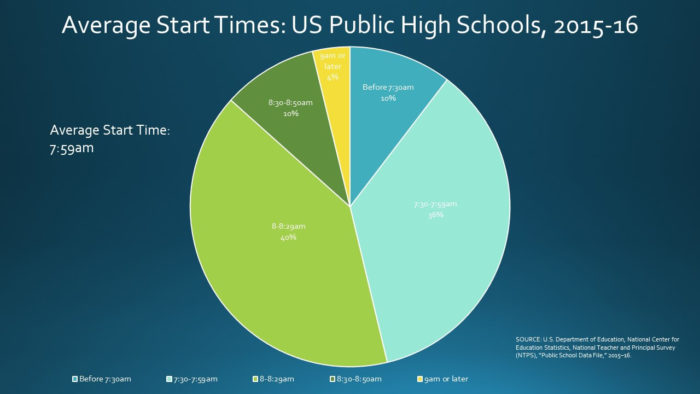Dec 13 2018
Delay School Start Times
 Living in a complex society means that some decisions are made for us. In a representative democracy, this means our elected officials, at every level, can have incredible power over our lives. The social contract, however, is that these elected officials should know what they are doing, act in the public interest, listen to their constituents, and engage in due diligence based on valid evidence-based processes. Well, that’s the ideal, and it’s pretty clear that we generally fall far short.
Living in a complex society means that some decisions are made for us. In a representative democracy, this means our elected officials, at every level, can have incredible power over our lives. The social contract, however, is that these elected officials should know what they are doing, act in the public interest, listen to their constituents, and engage in due diligence based on valid evidence-based processes. Well, that’s the ideal, and it’s pretty clear that we generally fall far short.
One limitation is that people are flawed and have complex motivations and often fall prey to ideology. However, there is also a collective problem of political will, with often perverse incentives baked into the system itself.
These inherent flaws in the system become increasingly frustrating as there are obviously better ways to do things, and yet we can’t seem to get out of our own way. On the bright side it is possible to slowly build the political will in response to a growing body of evidence. Scientific evidence on the risks of second-hand smoke, for example, supported the political will to ban smoking in many public locations, which has led to an improvement in health.
But there are other areas where the science is increasingly clear, the arguments seem one-sided, and yet we seem to be stuck in paralysis. Changing from Daylight Savings time to Standard time is hazardous. It is linked to worse sleep, more accidents, and even more heart attacks. There is also no good reason for the change. It’s just dumb. It seems that we are long past the time of having enough evidence, arguments, and political will to just ditch the change – so what’s the holdup?
Here is another issue that is gaining in evidence, public awareness, and hopefully political will – school start times. Many parents know that schools tend to start very early in the morning, especially high school. My daughter is out the door by 6:30. The apparent reason for this is so that there is enough time at the end of the day for sports and clubs, and still get children home before their parents are home from work.
But even if there is some scheduling convenience for the school for early start times, there is increasing evidence that it deprives students of sleep, harming their academic performance. This means that delaying school start times can improve sleep and academic performance. Now a new study adds fuel to this fire.
The Seattle School District recently delayed their high school start time by 55 minutes, from 07:50 to 08:45 a.m. This provided an opportunity to do a pre and post analysis, which they did. They found:
We carried out a pre-/post-research study and show that there was an increase in the daily median sleep duration of 34 min, associated with a 4.5% increase in the median grades of the students and an improvement in attendance.
An extra 34 minutes of sleep five days a week is huge. Chronic levels of even mild sleep deprivation have a cumulative effect, and definitely harm cognitive performance. Also, the improvement in attendance was greater for lower socioeconomic student, which means this could also reduce performance disparity by socioeconomic status.
This is a good study, and adds quality evidence to the debate on school start times. Momentum is building, and I hope that school systems seriously look at this issue.
I would, in fact, go a step further and allow students some flexibility in their schedule. There is also increasing recognition that people have different circadian rhythms – there are night owls and morning birds. If students have some flexibility in shaping their schedules they could skip the first period to have more time to sleep in, if that is important to them. This is probably more of an issue at college, when more students live on campus or can drive, but at least high school seniors can be given this option.
Flex time is also a good idea for many work environments (obviously not for all). Allowing workers that ability to have a less hectic morning, or sleep a bit more, may improve their productivity.
One caveat in all this is the Hawthorne Effect. This is an observer effect in which making any change and then observing the outcome can have a placebo-like nonspecific effect. If we really wanted to know the total effect of delaying school start times we would want to do controlled experiments in which other changes were also made, or times were delayed by different amounts, or even moved earlier. We would need to isolate the variable of delaying start time to isolate its specific effect.
These kinds of studies are unlikely to be done, however, for practical reasons. But also I don’t think they are completely necessary (while they would be interesting). We can infer a real benefit from the increased sleep of students (which was monitored directly by wearable wrist devices, btw). Further research should monitor these changes to see if the benefit are sustainable. Also, studies can be done to find the optimal start time.
Because this is a decision that local officials make for us and our children, they have a duty to make the best decision possible. This means gathering and following the evidence. Right now there is growing reliable evidence (although, again, not perfect) that a later school start time from the now very early start times of some high schools would have real benefits.






